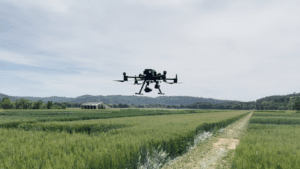Northern leaf blight, a devastating fungal disease of maize, often begins where farmers can’t easily detect it, far beneath the plants’ dense canopy.
But a ground rover exploring the plants from below, in communication with an airborne drone observing them from above, can create a fuller picture of their health than humans alone. A team of undergraduates in the College of Engineering, partnering with Michael Gore, Ph.D. ’09, professor of molecular breeding and genetics for nutritional quality in the College of Agriculture and Life Sciences, is aiming to use the tools of digital agriculture to spot this disease before it’s too late.
“The intent is to begin applying this in developing nations so farmers can detect early outbreaks of plant diseases that they have been combating for generations,” says Gore, who is also a Liberty Hyde Bailey Professor and international professor of plant breeding. “We can use robotics to do this work with greater precision, greater accuracy, less time and less labor.”
The project is supported by the new Shen Fund for Social Impact, which will enable students to pursue engineering projects that could benefit society by using technology in innovative ways. The Shen Fund, named for Cornell Engineering alumnus David T. Shen ’89, managing director of Olympus Capital Holdings Asia, a private equity group focusing on Asian middle market companies, will provide funding for three, three-year student-faculty projects annually.
“My education at Cornell was very multidisciplinary,” Shen says. “When I look back at my career in finance, I appreciate having the ability to look at problems in the real world from different perspectives, using my engineering, analytical approach. I wanted to come back and help current and future students have an opportunity to benefit from the same experience that I had.”
The leaf blight project is based on Gore’s ongoing work using digital tools to evaluate plant health conditions in real-time. The students hope data from the aerial drone and the ground rover, which will be modeled on the Mars rover, can be analyzed by deep learning algorithms to effectively predict the incidence and severity of disease.
“What you’d typically do is have a field surveyed by a crop scout, a human being, but we now have trained deep learning algorithms that are more accurate than the human beings themselves,” Gore says. “When you combine the robotic vehicles with deep learning, you’re enhancing what the humans are already doing. Then humans will use that collected information to decide how to act to prevent further disease spread.”
Led by engineering students Spencer Hong ’19, Nathan Zheng ’21, Lauren Zastko ’22 and Yitzy Rosenberg ’21, the team will work with Gore to develop a model enabling the rovers to communicate with drones using low-cost, open-source software that can be adapted for use in developing nations.
“We want to use the drone to detect the overall health of the plants, at a very high level, and use the robots to specifically target those areas underneath the canopy,” Zheng says. “We want the system to be generalized so that it can be applicable to many diseases and crops, and the key to this is creating different sorts of computer vision algorithms that can be trained to detect a variety of problems.”
The students hope to spend the first year exploring the problem, the second year developing tools and the third year implementing them in sub-Saharan Africa, where Gore is already conducting research. Future student projects could include digital agriculture, medical device sustainability, improving communication in remote areas or reducing water use in regions prone to drought.
“This is an ideal case where things that look challenging to the plant biologists were things that were just natural for the engineers,” says Mike Thompson, Cornell Engineering associate dean for undergraduate studies and associate professor of materials science and engineering. “The need is very clearly being driven by the plant biology and the impact of it, and engineering is the perfect vehicle for making these things happen.”
Source: Cornell












